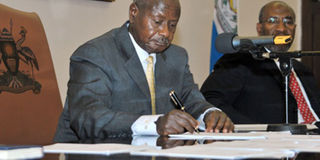US punishes Uganda for anti-gay law: Withdraws support to police, UPDF and Health

President Yoweri Museveni signs anti-gay bill into law in February at State House Entebbe. File photo
What you need to know:
KAMPALA RESPONDS: President Obama is deflecting domestic attention from stresses of Syria and Iraq wars. Spokesman Opondo says measures are inconsequential and Uganda will continue exercising its sovereignty
KAMPALA.
The United States cancels a planned aviation security exercise with the UPDF, slaps travel bans on Ugandan officials involved in “serious” human rights abuses, including of gays, or significant public corruption in raft of measures resulting from its review of relations with Uganda over the Anti-Homosexuality law.
In Kampala, the government invoked its resolve to exercise sovereignty to defend the internationally-impugned legislation with Spokesman Ofwono Opondo saying they will reprioritise resources in the new budget to “meet critical domestic obligations”. The travel bans, he says, are a “scare-crow because Ugandan officials can conduct international business” without having to physically be in the United States.
The White House in its Thursday statement announces “discontinuing or redirecting of funds for certain additional programmes involving the Ugandan Police Force, Ministry of Health, and National Public Health Institute.”
About $2.4 million (Shs6b) earmarked for community policing will be discontinued in part over Uganda police raid on the US-funded Makerere Walter Reed Project in Nakasero, a Kampala suburb, the Africa director at US National Security Council says.
US financial support for Ministry of Health staff salaries, travel expenses, and other items on health-related activities are being shifted to be executed by non-governmental partners.
Details show that a $3 million (Shs7.5 billion) National Public Health Institute which was planned to be established in Uganda will be relocated to an unnamed African country while a National Institutes of Health genomics meeting due in Kampala will instead now be held in South Africa.
The US in March had redirected funding from programme implementers whose willingness to serve all people in need it questioned, shifted certain military and intelligence engagements to other locations, and suspended near-term invitational travel for Ugandan military and police officials.
The monetary value of other affected programmes is not indicated and neither is there mention of when these decisions take effect.
After President Museveni in February assented to the anti-gay legislation, days after President Barack Obama warned that the “odious” law would complicate valued US-Uganda relations; Washington said it was reviewing its engagement with Kampala.
On Thursday, National Security Council Spokesperson Caitlin Hayden announced the new measures were intended to “further to reinforce our support for human rights of all Ugandans, regardless of sexual orientation or gender identity”.
“Specifically, the Department of State is taking measures to prevent entry into the United States by certain Ugandan officials involved in serious human rights abuses, including against LGBT individuals,” she says, “In addition, the United States will take steps, consistent with current authorities, to prevent entry into the United States by Ugandans who are found responsible for significant public corruption.”
In a rejoinder, Mr Opondo says the law was duly passed by Ugandan Parliament, and will be implemented until amended or nullified by court following a petition in Uganda’s constitutional court by a group of gay rights activist.
“These measures by the US government,” he says, “do not diminish our resolve to obtain and exercise full sovereignty. Mr Obama has more on his plate [with the war] in Syria and Iraq, and could be diverting domestic attention for a while.”
He challenged the US government to share with Uganda the list of its blacklisted for additional sanction at home because both corruption and violation of rights, including of LGBTs, are criminal offences.
America already largely withdrew direct support to government preferring to channel its assistance through non-governmental organisations as such its discontinuation or redirection of additional allocations would be inconsequential, Mr Opondo says.
Washington provides roughly $740 million to Uganda annually in development assistance, with much of the money going to health, mostly for supply of anti-retroviral drugs, as well as other health programmes and agriculture.
National Security Council Spokesperson Hayden on Thursday noted that the new sanctions would not however diminish the US commitment to provide development and humanitarian support for Ugandans or its partnership with the government to counter the Joseph Kony-led Lord’s Resistance Army and improve security in Africa.
She said: “We will seek to advance these interests even as we continue—in Uganda and around the world—to oppose discriminatory practices and champion human rights for all.




